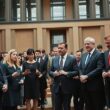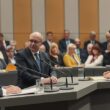European satellite operator Eutelsat is seeking German participation within its organization as it navigates increased competition, particularly from US-based Starlink. Jean-François Fallacher, the company’s recently appointed CEO, expressed Eutelsat’s openness to discussions with German entities in an interview with “Der Spiegel”.
Eutelsat operates the OneWeb satellite network, currently the only European constellation of communication satellites in low Earth orbit (LEO). However, the market is heavily dominated by Starlink, the network established by US entrepreneur Elon Musk. Fallacher’s stated goal is to develop OneWeb into an independent European alternative to Starlink.
The Paris-based company is currently seeking fresh capital investment from shareholders, including its primary stakeholder, France. Fallacher emphasized that Eutelsat is not solely a French entity and is actively seeking participation from other nations. “France has contributed significant capital, but Eutelsat will not be a French company” he stated.
Fallacher is advocating for a shift in the European space industry’s approach, arguing that it must adapt to a more competitive landscape. “The European space industry needs to understand that it’s being challenged by providers operating under different rules” he explained. He stressed the need for increased agility, a willingness to take risks and accelerated decision-making within the organization, highlighting potential cultural shifts as key to this transformation.
OneWeb’s capabilities are presently smaller and less robust than Starlink’s. To address this, Eutelsat is collaborating with Airbus Defence and Space, which will initially provide an additional 100 satellites. However, a modernization of the constellation will require approximately 400 new satellites over the next three years, according to Airbus Defence and Space CEO Michael Schöllhorn.
Schöllhorn also offered a measured perspective on the European Union’s planned Iris2 satellite project, slated for deployment around 2030. While acknowledging Iris2 as a “flagship project” he cautioned against relying solely on its future availability, particularly given the current geopolitical climate. He advocated for leveraging existing assets, such as the OneWeb constellation, enabling a gradual transition to Iris2.





